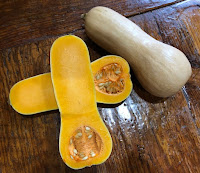Roasted Butternut Squash Soup
butternut seed had just become available about 1950. Butternut quickly replaced the traditional
Hubbard as the favorite winter squash.
As its name indicates, the squash is both buttery and nutty in flavor. These features are most
pronounced when the fruits are fully mature, with the skin thick and uniformly tan and the stem
hard and dry. The flesh is then rich orange and sweet. Its luscious intensity is further enhanced
by baking.
Here is an evocative favorite butternut dish for the fall season, roasted butternut soup. It is not too
difficult and shows the squash off to advantage. The recipe serves six, but extra soup stores well and seems even better after a day or two. While typically served hot, butternut soup can also be eaten cold like its non-relative, gazpacho.
1 large or 2 medium butternut squash (about 2 pounds), ripe and hard1 small onion, finely diced
A 6-inch piece of celery, finely diced
6 tablespoons butter
5 cups chicken broth (low salt) or vegetable broth
1 1/2 teaspoons salt plus more to taste
1/2 teaspoon ground black pepper
1/4 teaspoon oregano
1/8 teaspoon ground cinnamon
A small pinch of ground cloves
(3 tablespoons cashew butter or ground cashews, optional)
Minced parsley or tiny sprouts (leafy parts) for garnish
Set oven for 350 degrees.
sheet and roast it until tender when pierced with a toothpick. Let cool.
Meanwhile prepare the onion and celery and fry them gently in the butter using the pot in which
you will make the soup. Stir frequently and fry until the vegetables are tender but not browned.
Remove from the heat.
When the baked butternut is cooled somewhat, scoop all the flesh out from the skin. Place it,
along with the fried onion-celery mixture and its butter in a food processor or blender (this may
need to be in two batches), adding a little of the chicken or vegetable broth. Puree the mixture.
Transfer it back into the pot. Add the remainder of the broth, the salt and spices (and cashew
butter if used). Simmer for 4-5 minutes, stirring occasionally. Taste for salt, and add a little, if
needed, to taste.
Serve sprinkled with finely minced parsley or tiny leaves from baby sprouts.

.png)



